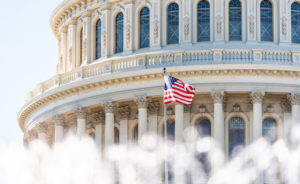
Special Counsel explains his decision not to prosecute the President, Supreme Court declines to rule on abortion, and more…
IN THE NEWS
- Special Counsel Robert Mueller explained that his office did not consider charging President Donald J. Trump with obstruction of justice because of an internal U.S. Department of Justice (DOJ) policy that prohibits indicting sitting a President. But Mueller stated that “if we had had confidence that the President clearly did not commit a crime, we would have said so.” Following Mueller’s remarks, Senator Cory Booker (D-N.J.) stated that “Congress has a legal and moral obligation to begin impeachment proceedings immediately.” Senator Lindsey Graham (R-S.C.), however, maintained that “the case is over” and urged Congress to move on.
- In what is being described as a narrow opinion, the U.S. Supreme Court reversed part of a U.S. Court of Appeals for the Seventh Circuit decision striking down an Indiana law requiring burial of fetal remains after an abortion. The Court declined to rule on another portion of the Seventh Circuit decision striking down the law’s provisions that banned abortions on the basis of race, sex, or disability of the fetus. Justice Clarence Thomas concurred with the outcome of the Court’s decision but wrote separately to argue that the Court will need to examine the scope of abortion rights more broadly in the near future.
- At the request of Republican state officials, the Supreme Court issued a series of orders temporarily pausing lower court rulings that ordered Ohio and Michigan to redraw their electoral district maps due to partisan gerrymandering. The orders reportedly were widely expected in light of the Court’s pending decisions in redistricting cases in North Carolina and Maryland, which are anticipated to address the role that courts should play in resolving partisan gerrymandering claims. In opposing the stay, the League of Women Voters of Michigan argued that granting the requests would “effectively deny Michigan voters the only relief they seek” by delaying the redistricting process beyond the 2020 election.
- The U.S. Court of Appeals for the D.C. Circuit affirmed the dismissal of a lawsuit filed by the government watchdog Citizens for Responsibility and Ethics in Washington that alleged that the use of digital apps that automatically delete messages between White House officials violates the Presidential Records Act (PRA). Judge David Tatel acknowledged that “Richard Nixon could only have dreamed of the technology at issue.” But he ruled that the court lacked jurisdiction to “micromanage” the White House’s compliance with the PRA.
- In a report analyzing the currency practices of major U.S. trading partners, the U.S. Department of the Treasury found that no country qualified as a “currency manipulator” under applicable legislation. Under standards adopted in 2016, a country only qualifies as a currency manipulator if it exports to the United States more than it imports, maintains an overall trade surplus, and persistently intervenes in the market for its currency. The report follows a recent proposed rule from the U.S. Department of Commerce that would expand the United States’ ability to penalize currency manipulators through “countervailing duties,” which are special tariffs designed to offset the advantages a foreign government collects from manipulating its currency.
- Pro-European Union parties retained a majority of seats in the ninth European Parliament elections despite minor gains by far-right and Euroskeptic groups, according to preliminary results. The Green Party also claimed victory, winning 69 out of 751 seats, 18 more than it had previously held. Ska Keller, co-P\president of the Greens/EFA Group in the European Parliament, said that the results “exceeded expectations” and that the “trust given to us by voters is both a task and a responsibility to put green policies into action.”
- Maine Governor Janet Mills signed a bill enacting a statewide ban on gay conversion therapy. The bill aims “to protect the public health and the safety of all youth of the State, including lesbian, gay, bisexual and transgender youth.” The new law also prohibits “advertising, offering and administering of therapy designed to change a person’s sexual orientation or gender identity” to minor residents of the state. Marty Rouse, national field director for the Human Rights Campaign, applauded Maine’s lawmakers for “their leadership in taking up this important issue.”
- Wynn Resorts paid a $35 million fine to the Massachusetts Gaming Commission for failing to disclose allegations of sexual assault against founder Steve Wynn when the company applied for its state gambling license in 2013. The company said it would not file an appeal, but disputed the finding that CEO Matthew Maddox, who was independently fined $500,000, violated company policy by failing to adequately investigate the allegations.
- The Arizona Supreme Court unanimously ruled that the Arizona Medical Marijuana Act (AMMA) specifically protects patients from possessing any part of the marijuana plant. Arizona prosecutors had argued that, in a criminal possession case, prosecutors should apply the more strict criminal definition of marijuana. Vice Chief Justice Robert Brutinel, however, held that “AMMA defines ‘marijuana’ to mean ‘all parts of any plant of the genus cannabis,’” which precludes reliance on the criminal code.
WHAT WE’RE READING THIS WEEK
- In an opinion piece published in The New York Times, Emily Reina Dindial of the ACLU and Ronald Lampard of the American Legislative Exchange Council stated that laws suspending a driver’s license for failing to pay unpaid tickets should be repealed. Such legislation, they argue, creates a self-perpetuating cycle of poverty for those who cannot afford to pay their fines. They underscore that, because most Americans lack access to reliable public transportation, losing the ability to drive could include loss of employment as well.
- In an article for the Harvard Law School Forum on Corporate Governance and Financial Regulation, Nell Minow of ValueEdge Advisors cautioned the U.S. Department of Labor against restricting pension fund managers’ ability to account for climate change or other environmental risk through proxy voting. President Trump recently instructed the Labor Department to reevaluate its longstanding requirement that all proxy-related decisions be made for the exclusive benefit of plan participants. But Minow argued that shareholder interest is best served by continuing to allow managers to exercise their best judgment concerning the risks of climate change.
- In a forthcoming article in the UNLV Gaming Law Journal, Ryan Rodenberg of the Florida State University College of Law argued that the Professional and Amateur Sports Protection Act (PASPA) is unconstitutional for giving private sports leagues regulatory power which Congress may only delegate to other government actors. PASPA was enacted in 1992 to prohibit states from promoting sports betting. In 2018, the U.S. Supreme Court ruled that PASPA was unconstitutional, but the Court limited its reasoning to the so-called anti-commandeering doctrine, which prohibits Congress from ordering states to regulate. Rodenberg concluded that Congress must also recognize the significance of the “non-delegation doctrine,” which prohibits the delegation of regulatory authority to private parties.



